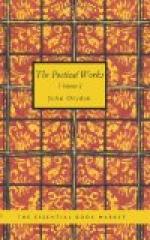By trade a Levite, though of low degree:
His pride no higher than the desk aspired,
But for the drudgery of priests was hired
To read and pray in linen ephod brave,
And pick up single shekels from the grave.
Married at last, but finding charge come faster, 360
He could not live by God, but changed his master:
Inspired by want, was made a factious tool,
They got a villain, and we lost a fool.
Still violent, whatever cause he took,
But most against the party he forsook;
For renegadoes, who ne’er turn by halves,
Are bound in conscience to be double knaves.
So this prose-prophet took most monstrous pains
To let his masters see he earn’d his gains.
But, as the devil owes all his imps a shame, 370
He chose the apostate for his proper theme;
With little pains he made the picture true,
And from reflection took the rogue he drew.
A wondrous work, to prove the Jewish nation
In every age a murmuring generation;
To trace them from their infancy of sinning,
And show them factious from their first beginning.
To prove they could rebel, and rail, and mock,
Much to the credit of the chosen flock;
A strong authority which must convince, 380
That saints own no allegiance to their prince;
As ’tis a leading-card to make a whore,
To prove her mother had turn’d up before.
But, tell me, did the drunken patriarch bless
The son that show’d his father’s nakedness?
Such thanks the present church thy pen will give,
Which proves rebellion was so primitive.
Must ancient failings be examples made?
Then murderers from Cain may learn their trade.
As thou the heathen and the saint hast drawn, 390
Methinks the apostate was the better man:
And thy hot father, waving my respect,
Not of a mother-church but of a sect.
And such he needs must be of thy inditing;
This comes of drinking asses’ milk and writing.
If Balak should be call’d to leave his place,
As profit is the loudest call of grace,
His temple, dispossess’d of one, would be
Replenished with seven devils more by thee.
His pride no higher than the desk aspired,
But for the drudgery of priests was hired
To read and pray in linen ephod brave,
And pick up single shekels from the grave.
Married at last, but finding charge come faster, 360
He could not live by God, but changed his master:
Inspired by want, was made a factious tool,
They got a villain, and we lost a fool.
Still violent, whatever cause he took,
But most against the party he forsook;
For renegadoes, who ne’er turn by halves,
Are bound in conscience to be double knaves.
So this prose-prophet took most monstrous pains
To let his masters see he earn’d his gains.
But, as the devil owes all his imps a shame, 370
He chose the apostate for his proper theme;
With little pains he made the picture true,
And from reflection took the rogue he drew.
A wondrous work, to prove the Jewish nation
In every age a murmuring generation;
To trace them from their infancy of sinning,
And show them factious from their first beginning.
To prove they could rebel, and rail, and mock,
Much to the credit of the chosen flock;
A strong authority which must convince, 380
That saints own no allegiance to their prince;
As ’tis a leading-card to make a whore,
To prove her mother had turn’d up before.
But, tell me, did the drunken patriarch bless
The son that show’d his father’s nakedness?
Such thanks the present church thy pen will give,
Which proves rebellion was so primitive.
Must ancient failings be examples made?
Then murderers from Cain may learn their trade.
As thou the heathen and the saint hast drawn, 390
Methinks the apostate was the better man:
And thy hot father, waving my respect,
Not of a mother-church but of a sect.
And such he needs must be of thy inditing;
This comes of drinking asses’ milk and writing.
If Balak should be call’d to leave his place,
As profit is the loudest call of grace,
His temple, dispossess’d of one, would be
Replenished with seven devils more by thee.
Levi, thou art a load, I’ll
lay thee down, 400
And show Rebellion bare, without a gown;
Poor slaves in metre, dull and addle-pated,
Who rhyme below even David’s psalms
translated;
Some in my speedy pace I must outrun,
As lame Mephibosheth the wizard’s
son:
To make quick way I’ll leap o’er
heavy blocks,
Shun rotten Uzza, as I would the pox;
And hasten Og and Doeg to rehearse,
Two fools that crutch their feeble sense
on verse:
Who, by my muse, to all succeeding times
410
Shall live in spite of their own doggrel
rhymes.




